|
After the potatoes are added, the group watches warily to see that all the electric motors on the stirring machines keep running. "It's not unusual to have problems with the stirrers right now," explains Don Wessler. "What often happens is that a potato gets stuck under one of the paddles, and it stops turning."
Just as he predicted, one of the machines stops turning, and they move in for a closer inspection. Steve Stocker grabs a wooden stirring paddle, and Joe Huey stands next to the kettle and pokes at the motor. First they try to push the stirrer along with the end of the wooden paddle, but when that doesn't work Joe decides it's a problem with the belt on the motor. "It's too big," he says. "We're going to have to replace it."
None of them wants to remove the stirrer from the kettle because it would be impossible to put back into place, and it would mean stirring that kettle by hand the rest of the night. But the broth is at a full boil, and it must be stirred so the potatoes won't scorch.
Putting a new belt on the motor means working right next to the heat of the fire, which none of the men can stand for more than a minute or two. "I made the mistake of wearing polyester pants one time," Lee Burrus tells me. "I stood close to the kettles for just a minute, and that fabric really got hot."
Joe continues to work on the stopped motor, and Don yells to him half-jokingly, "Go over to the fire house and get your fire pants on!"
He finally calls for a pair of gloves, and works until he gets the oversized belt off the wheel. "I don't see how he can stand the heat," says Don.
Meanwhile, Gary Blum and Mike Schone sort through a pile of belts to find one with a better fit, and Craig Gregory reaches in the kettle with a paddle to stir the soup. Another man walks down the line of kettles to make sure all the other stirrers are still moving. I wonder aloud why more of them aren't having problems. |
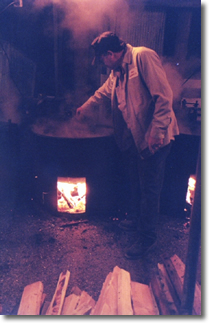
Avoiding the heat from the fire, Tony Thomas leans over to push some vegetables off the top of the stirring paddle and into the soup. Just a minute or two beside the kettle gets too warm.
|
|
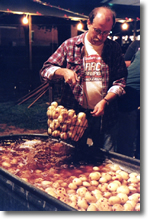
Rus Lutkehus lifts a bucket of potatoes from the tank to weigh them.
|
"Don't say that!" exclaims Steve. "We had real problems one year when three of the stirrers stopped at once. We were really busy trying to get 'em all going again."
By this time, Joe is hovering over the kettle and making quick strikes at the motor as he works the new belt into place. Once it's on, he connects the motor to electrical power, and it takes off again. Success!
As the last of the potatoes goes in, a couple of men debate the relative merits of cutting up the potatoes before adding them to the boiling kettles, and Don adds that he tried it with a private batch. "It seemed to really change the taste," he said, "and you wouldn't think that something as minor as that would really make a big difference."
After the pototoes have cooked a while, other fresh vegetables follow in quick succession. Each time, Hondo Huey figures how many pounds goes into each kettle, and they measure out twelve separate batches. |
|
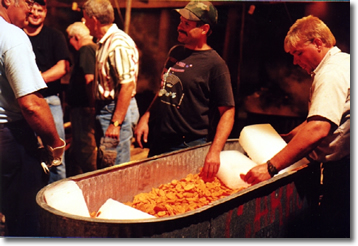
Joe Huey (center) smiles at a remark from Gary Blum (left) as he reaches to snitch a carrot slice. Craig Gregory is at far right, and in the background are Joe Lovekamp, Myron Beard and Don Wessler.
|
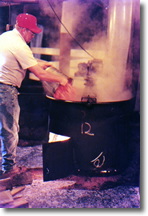
Mike Schone adds a bucket of carrot slices to a boiling kettle.
|
|
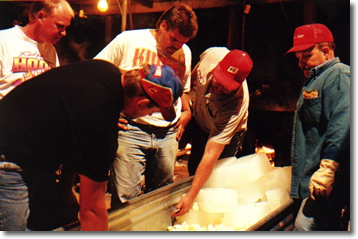
Joe Lovekamp, Marc Carls, Hondo Huey, Mike Schone and Tim LeFebvre judge the amount of onions that should go into each kettle. Ice blocks piled at the end of the tank are used to keep the remainder of onions fresh for the next night.
|
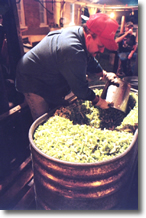
Tim LeFebvre scoops up a bucketful of chopped celery.
|
Sufficient amounts of each ingredient are reserved to start three additional kettles of soup around 7: 00 a.m. That way, Don explains, there are three fresh kettles of soup ready for Friday evening's soup line.
The kettles are kept at a full boil the whole time, and occasionally some water is added when the broth cooks down too far. After a couple of hours, the soup takes on the consistency of ordinary vegetable soup, with chunks of vegetables churning in a brown stew. The crew is waiting until just a few hours before daylight to add the cabbage and the canned ingredients.
It is already past midnight, and some of the men have finished their shift and gone home. A night chill has set in, and I pull a chair closer to the kettles to keep warm. It occurs to me that it is long past the couple of hours I said I would be here, but now I feel almost as if I need to stay to see how it all ends...
Continued ...
|
 ARENZVILLE, IL | HOME OF THE WORLD'S BEST BURGOO
ARENZVILLE, IL | HOME OF THE WORLD'S BEST BURGOO 




